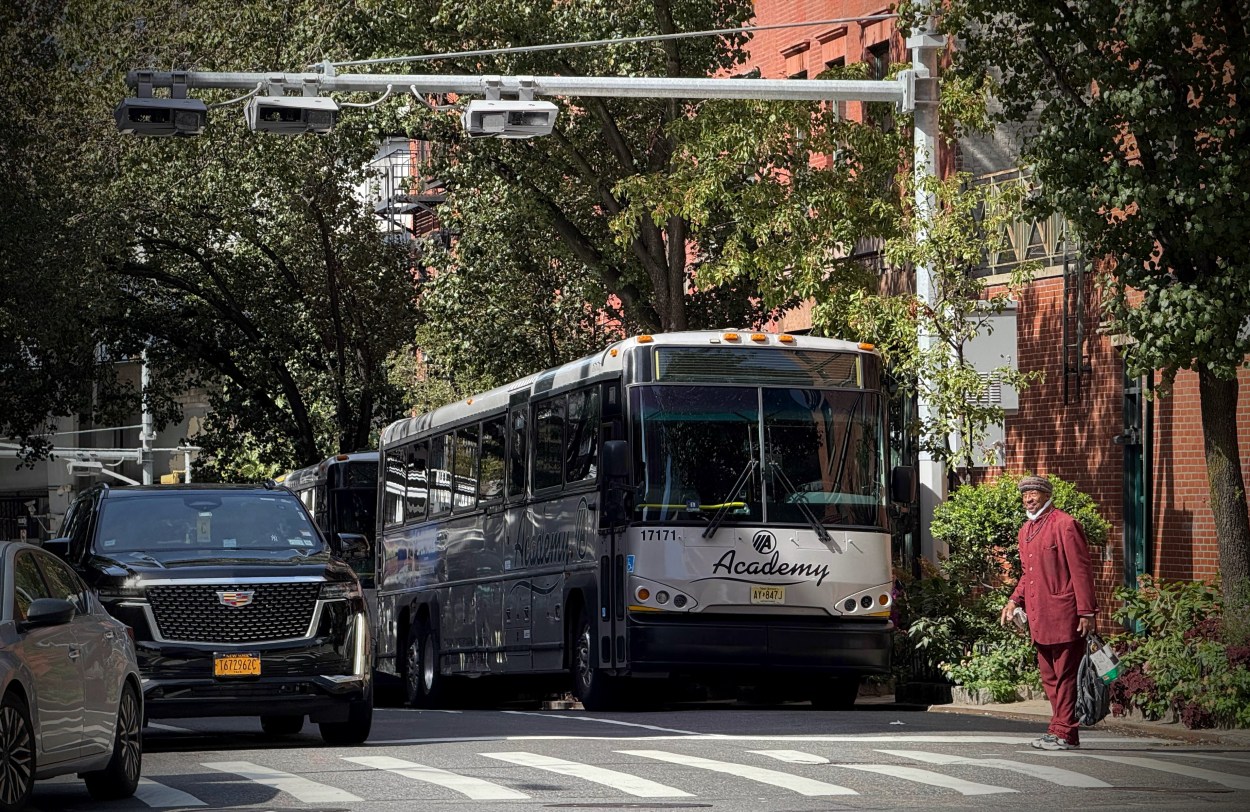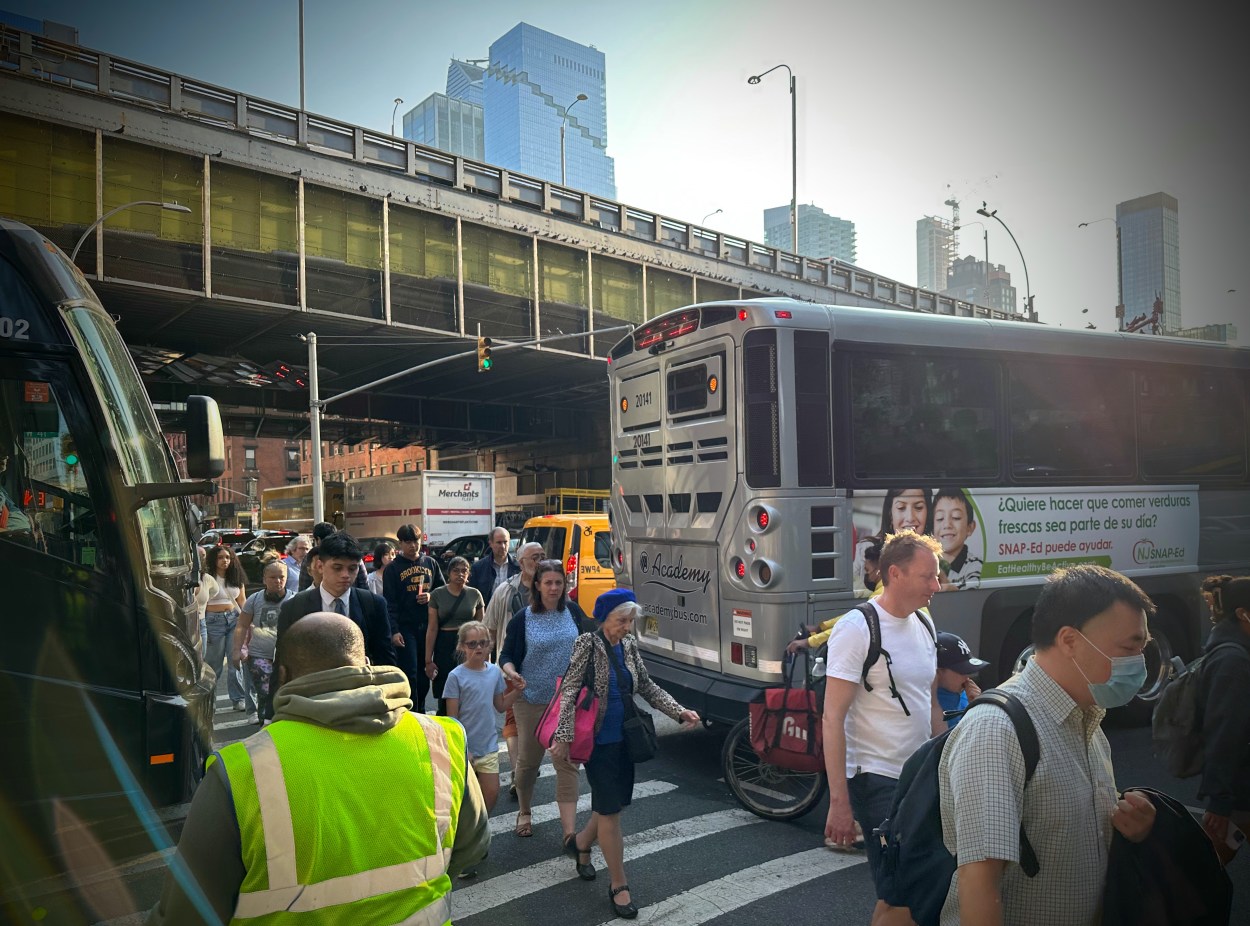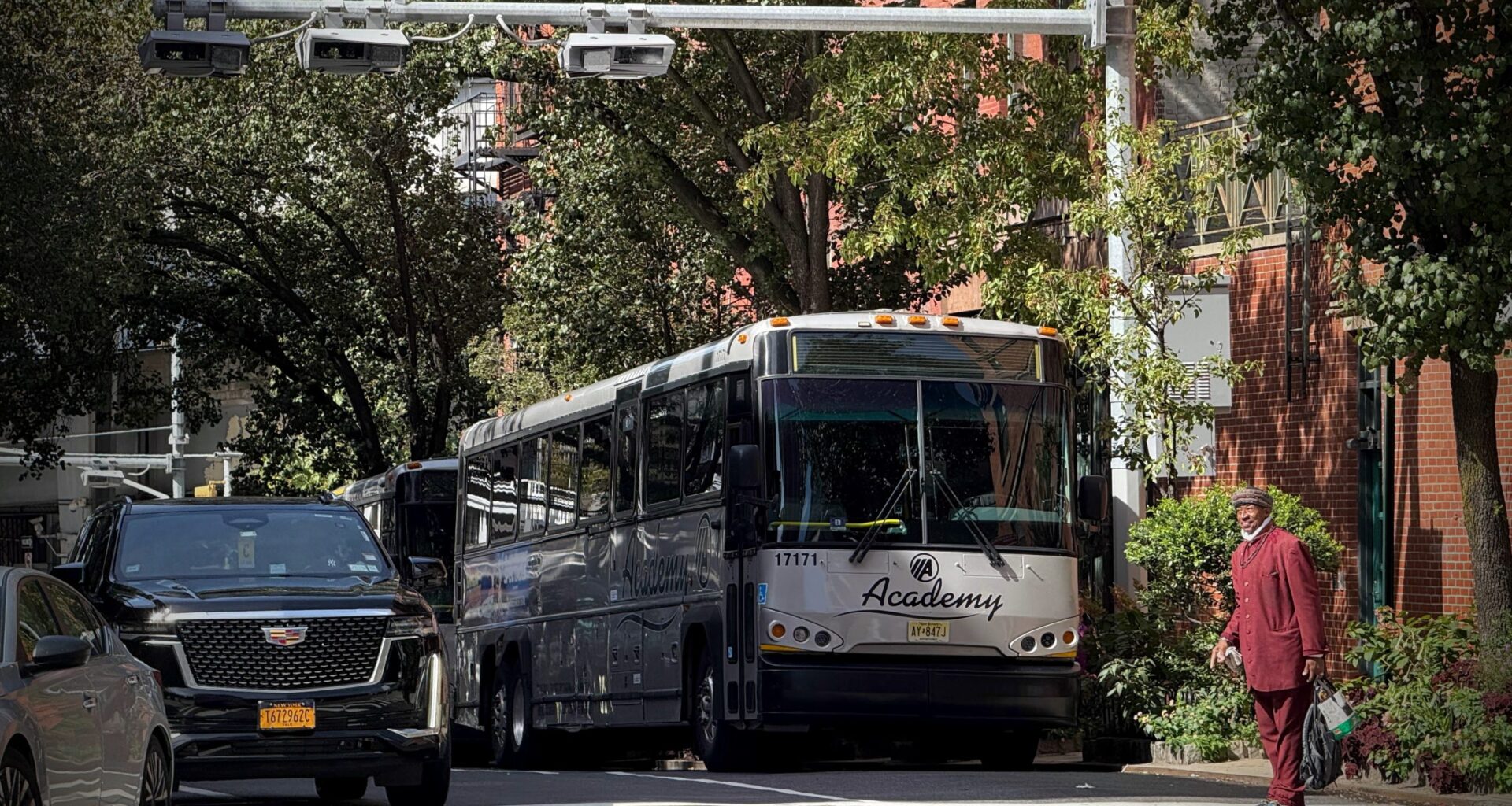Hell’s Kitchen residents are pushing back against a bid by New Jersey-based Academy Bus Lines to sidestep New York City’s decades-old anti-idling law — a move activists warn would worsen already poor air quality in Midtown West and set a dangerous precedent citywide.
 An Academy bus parked on W40th Street and 9th Avenue. Photo: Phil O’Brien
An Academy bus parked on W40th Street and 9th Avenue. Photo: Phil O’Brien
Academy, which operates hundreds of charter and commuter buses throughout the city, has asked the Department of Environmental Protection (DEP) for a broad variance from the city’s 1972 ban on idling longer than three minutes. The company argues that “no technological alternative exists” to heat, cool and power its 723-vehicle fleet without keeping engines running.
But local advocates — including long-time Hell’s Kitchen activist Christine Berthet of CHEKPEDS — say the company’s request is an assault on clean-air protections that communities have fought for decades to enforce.
“Our district has the third worst air quality in New York City,” said Berthet. “The arguments presented by Academy do not pass muster — they claim they can’t install automatic shutoffs or auxiliary engines, or even train their drivers — all solutions that other companies have successfully adopted.”
New York City’s idling ban, largely ignored for decades, gained teeth after the City Council introduced the Citizens Air Complaint Program in the late 2010s, allowing residents to report violations and share in fines. That change turned Hell’s Kitchen’s busy bus corridors into enforcement hotspots, as residents filmed idling tour, charter and commuter buses parked along 8th, 9th and 10th Avenues.
Academy has been one of the program’s top violators — racking up over $566,000 in fines, according to the DEP. In its request for an exemption, the company called the fines “a major, unsustainable hardship” and warned it may stop operating in the city if forced to comply.
In its variance request, Academy said it has “done what it can to eliminate unnecessary idling” and argued that shutting engines off is “not practical” because the systems that control air circulation, wheelchair lifts, door brakes and onboard safety equipment all rely on continuous engine power. The company said idling is sometimes needed to maintain safe cabin temperatures for passengers — including seniors and children — and that “there are no commercially available auxiliary power units capable of providing power for these critical systems.” Academy described its clean diesel fleet as among the most efficient forms of mass transit, noting that buses “prevent millions of car trips into New York City” each year and that it “looks forward to adopting electric or hybrid technology once it becomes feasible.”
Advocates are skeptical. “Residents of New York City should not have to bear the brunt of Academy’s financial travails,” Berthet said. “Nor should we risk inflicting a fatal blow to the idling law for them.”
 An Academy bus crossing 9th Avenue and W41st Street. Photo: Phil O’Brien
An Academy bus crossing 9th Avenue and W41st Street. Photo: Phil O’Brien
DEP Commissioner Rohit Aggarwala told Streetsblog that the company’s case “appears strong,” though he added that the department hopes to hear from experts and advocates at the upcoming hearing. “We may need to balance air-quality issues against the value of bus transit,” Aggarwala said.
Environmental groups say granting this variance would effectively “gut” one of New York’s strongest pollution controls. The New York Clean Air Collective warned that diesel exhaust already contributes to the early deaths of 3,200 New Yorkers annually — a figure that could rise if idling exemptions expand.
Even as Academy claims electrification is “not feasible,” other companies have agreed to transition their fleets or install automatic shutoff systems. In Washington DC, a similar company recently settled a lawsuit by committing to program engines to shut off after three minutes, and paying an $85,000 fine.
Under our settlement, DC Trails will:
➡️ Program its bus engines to shut off after three minutes of idling
➡️ Conduct anti-idling training for its drivers
➡️ Submit to compliance monitoring
➡️ Pay $85,000 in penalties
➡️ Pay additional penalties for any further noncompliance
— AG Brian Schwalb (@DCAttorneyGen) October 9, 2025
Councilmember Shaun Abreu, who represents parts of Manhattan where Academy’s Columbia University buses have been caught idling near a daycare center, said he plans to testify against the company.
“Illegal and persistent idling in our neighborhood is completely unacceptable,” said Abreu. “Giving them a free pass opens the door to further pollution without consequence. Upper Manhattan is long overdue for accountability and clean air.”
At Monday’s Executive Committee meeting, Manhattan Community Board 4 (CB4) voted to send a letter to the DEP opposing Academy’s request and authorized board member Christine Berthet to testify on CB4’s behalf at Wednesday’s hearing. Berthet warned that granting the waiver “would open the floodgates,” allowing not just other bus companies but trucking operators and “many more” to seek similar exemptions — effectively eviscerating the idling law in a district that already has the third-worst air quality in the city. She said the company’s claim that auxiliary engines cannot be installed is misleading because many of their commuter and charter buses “do not typically carry luggage and thus have plenty of space in the luggage bay.”
 The Community Board authorized Christine Berthet to speak at the DEP Public Hearing to oppose the Academy exemption request. Photo: Phil O’Brien
The Community Board authorized Christine Berthet to speak at the DEP Public Hearing to oppose the Academy exemption request. Photo: Phil O’Brien
The DEP will hold a virtual public hearing at 11:30am on Wednesday, October 29, where members of the public can testify or submit written comments online via a form.
Berthet urged Hell’s Kitchen residents to speak up. “Please testify,” she said. “This proposal would make our bad air quality much worse — and it risks undermining one of the city’s most effective environmental laws.”
